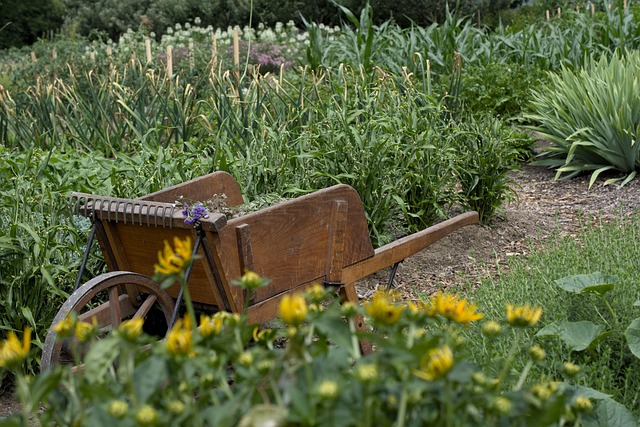Climate change disrupts garden ecosystems, requiring proactive strategies like seasonal pest control tailored to local shifts. An integrated approach combines cultural (rotation, companion planting), biological (beneficial insects), and targeted chemical controls. Healthy soil through organic solutions and cover crops enhances resilience against pests and diseases. Selecting climate-adapted plants and regular maintenance, including monitoring and adapting care routines, ensure garden health and vibrancy despite changing climatic conditions.
In an era of escalating climate change, preparing your garden for shifting conditions is paramount. This article guides you through proactive strategies to ensure your green sanctuary thrives despite changing temperatures and weather patterns. From understanding the unique impacts on your garden to implementing effective seasonal pest control techniques, we explore essential steps for fostering resilience. Learn how enhancing soil health and thoughtfully selecting plants can equip your garden to adapt and flourish in an ever-evolving climate.
- Understanding Climate Change Impacts on Gardens
- Seasonal Pest Control Strategies for Adaptability
- Enhancing Soil Health for Resilience
- Proactive Plant Selection and Maintenance Techniques
Understanding Climate Change Impacts on Gardens

Climate change is presenting gardens with unprecedented challenges, from shifting growing seasons to more frequent extreme weather events. These shifts can disrupt established ecosystems and introduce new pests and diseases that were previously absent or less prevalent. For instance, warmer temperatures may encourage certain insect species to breed earlier or expand their ranges, while changing rainfall patterns could lead to increased humidity, creating ideal conditions for fungal infections.
Proactive garden care in the face of climate change involves implementing strategies that build resilience against these impacts. Seasonal pest control measures, tailored to the shifting cycles and patterns, become increasingly vital. By staying informed about local climate shifts and adjusting gardening practices accordingly, you can protect your garden’s health and vibrancy in a changing world.
Seasonal Pest Control Strategies for Adaptability

In the face of changing climates, implementing proactive seasonal pest control strategies is vital for adapting your garden’s ecosystem. Different seasons bring unique challenges from pests and diseases that can disrupt the delicate balance of your garden. A robust seasonal pest control plan involves understanding the life cycles of common pests and employing targeted methods to manage their populations. For instance, spring may require focus on preventing insect larvae from establishing while summer could involve monitoring for specific aphids and mites. Fall and winter have their own set of pests to consider, like winter moths or leaf-eating caterpillars.
Adopting an integrated pest management (IPM) approach is key. This involves a combination of cultural, biological, and chemical control methods. Cultural practices such as crop rotation, companion planting, and maintaining good garden hygiene can significantly reduce pest pressure. Biological controls include introducing beneficial insects that feed on garden pests. Chemical options should be used judiciously, focusing on targeted applications to minimize environmental impact. By integrating these strategies, gardeners can foster a resilient garden ecosystem capable of withstanding seasonal shifts and the associated pest pressures.
Enhancing Soil Health for Resilience

Maintaining healthy soil is a proactive step to ensure your garden can adapt and thrive in changing climates. Soil health is the foundation for resilient plant growth, as it provides essential nutrients, moisture retention, and a stable environment for roots to flourish. Implement seasonal pest control methods that focus on organic solutions, such as introducing beneficial insects or using natural repellents, to promote a balanced ecosystem. By improving soil structure through additions like compost or well-rotted manure, you enhance its ability to withstand extreme temperatures and drought conditions.
Additionally, incorporating cover crops during off-seasons can prevent soil erosion, suppress weeds, and improve nutrient cycling. These practices contribute to a robust soil microbiome, fostering a natural resistance to diseases and pests. In turn, healthier soils support plants that are better equipped to resist environmental stressors, ensuring your garden’s longevity and beauty despite shifting climatic conditions.
Proactive Plant Selection and Maintenance Techniques

Selecting plants adapted to your region’s evolving climate is a proactive step in garden care. As temperatures rise and weather patterns shift, choose species resilient to heat, drought, or excessive rainfall—whichever is more common in your area. This ensures your garden remains healthy with minimal stress. Diversifying plant types and varieties can also help attract beneficial insects that ward off pests naturally, reducing the need for chemical interventions.
Regular maintenance includes monitoring for signs of seasonal pests and diseases. Implement integrated pest management (IPM) strategies, focusing on preventive measures like physical barriers, cultural practices (e.g., proper spacing, air circulation), and biological controls. Seasonal rotations of crops or plant groupings can disrupt pest life cycles. Stay informed about regional gardening tips and adapt your care routine accordingly to keep your garden thriving in changing climates.
As we navigate a changing climate, adopting proactive measures in our gardens is essential. By understanding the impacts of climate change, implementing strategies for enhanced soil health, and selecting resilient plant varieties, we can foster thriving outdoor spaces. Integrating effective seasonal pest control methods further strengthens our gardens’ ability to adapt, ensuring they remain vibrant and sustainable despite shifting environmental conditions. These comprehensive approaches empower us to cultivate lush oases that resonate with the dynamic world around us.
